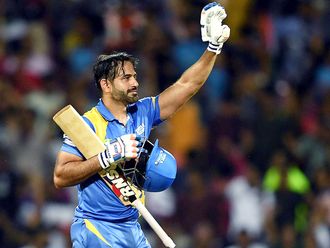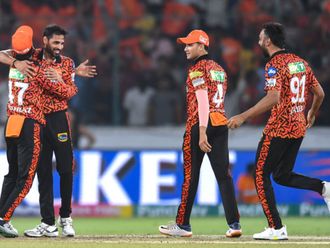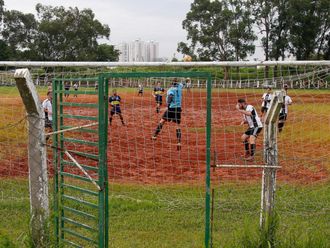
St Andrews, Scotland: Colin Montgomerie tramped off the 18th green, tossed a polite refusal to interview requests and disappeared through the crowds without a backward glance.
At some stage in his remarkable career — and preferably here, among his own folk — Montgomerie should have celebrated a major victory. He had the ability and the confidence, and certainly he had sufficient opportunity. But it was never to be. And now, while younger men of burgeoning gifts dispute matters at the head of The Open field, he is attempting to come to terms with his new, reduced status.
Being Montgomerie, he is not going gently into that good night. He remains utterly compelling theatre, a tortured soul amid so much assurance. He seems aware that his current status of Ryder Cup captain imposes certain responsibilities, yet he is never more than a whiff of cordite away from the next explosion.
And he knows the explosion is coming. Worse, he knows that we know.
Rare frame
His attempts at affability seem more improbable than ever. He strides on to the first tee with his face arranged in a grin. "He's smiling!" says a disbelieving Scottish photographer. "I've got lots of pictures of him smiling," replies his colleague. "Well, maybe three or four."
They are not alone in their surprise. The attendant at the first crossing point studies Monty's face. "He's smiling!" he says. And then, after reflection: "Still, it's early days." The crowds deliver the lines they recall from the good old days: "Come on, Monty!" they bawl. "Go get 'em, Big Colin." He rewards them with a regal wave, more smiles, a nod of his visor. The opening hole is safely parred, and tranquillity reigns.
It cannot last; neither the weather nor Montgomerie's mood. He bogeys the second after a wayward drive, and worse follows with double-bogey at the third. By now, playing partner Steve Stricker is keeping his distance.
His drive at the fourth hole lands on a gravel path. The spectators take three steps back, fearful of his wrath. With an immense effort of will, he controls his emotions. He asks for a rope to be moved, keeps his tone level, remembers to say "please". But he lashes his three-wood into the gorse, and another shot is dropped.
At this stage, the round is drifting towards disaster. Montgomerie is moving beyond anger to something like distracted resignation. Then a couple of things happen to temporarily alter his mood.
First, he eagles the fifth, courtesy of a tremendous approach shot. "I needed that," he announces. Then, on the sixth, he spots his wife and stepdaughter in the crowd, and his face lights up.
Walking down the seventh fairway, with sudden rain descending, he ducks beneath the ropes and calls his family to shelter beneath his umbrella. They walk together through the downpour, but he is edgily aware that chances are being missed, that another major will end with him way out of contention.
Reaching the eighth, it boils into a four-letter rant to his caddie, cursing his missed chances. "Those pins at six, seven and eight were easy. They were Dunhill Cup pins." The caddie is placatory. A hare bounds across their path. Montgomerie glares at the frightened animal.
Loud applause
The switchback ride continues. He birdies the ninth, to loud applause from his most loyal fans; three lads in bubbly wigs who call themselves The Fool Monty. Impulsively, he throws them the ball. They cheer him more loudly.
He double-bogeys the Road Hole, snarls his way to the 18th tee, then plays the final hole with style and class and wondrous ease, finishing with a birdie and reminding the galleries of just what a player he used to be, when the mood was on him and the magic was flowing. He finishes with a 74, three shots over for the tournament. A footnote in The Open story.








